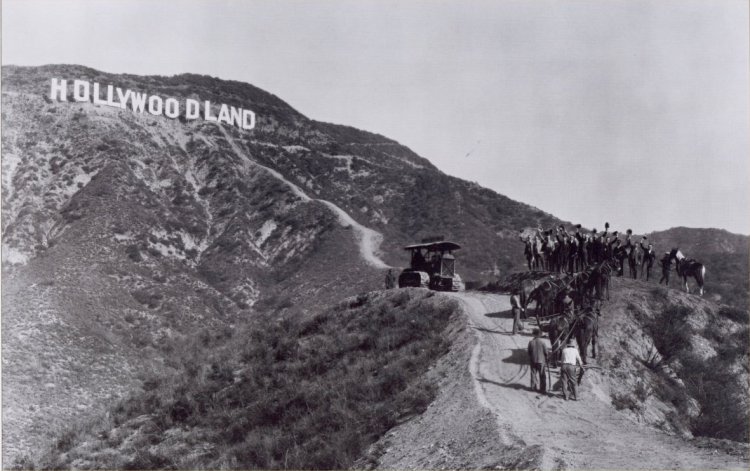
- At first the iconic sign read “Hollywoodland” after that “land” was removed and it has been known as “Hollywood” ever since.
When one hears the word’ Hollywood’, the first thing that pops in mind is movies. There’s a reason why Los Angeles became the center of motion pictures. It all started with a few independent studios that ventured as far away as possible from “the trust”, mainly Thomas Edison and his lawsuits, and so they headed to L.A. to distribute, produce, and exhibit their movies. The fact that Los Angeles was far away from New York helped make it the home for independent film studios. Even though there was still a presence of the major film studios in Los Angeles, it was not till after independent film studios realization of the positive aspects about L.A.’s location that Hollywood was finally established. The four major positive aspects were basically the fact that L.A. was sunny all year long, the property was inexpensive, it was an open shop town, and of course the variety of locations and geography. These conditions made it perfect for any studio to shoot movies. Soon almost every studio be it major or independent wanted to settle there, making Hollywood full of film factories.
Once Hollywood became the center of the film industry in the US, a system had to be established which introduces us to the studio system. The system was first and foremost designed to ensure the cost and quality of the movies being produced. Having a system made Hollywood a much more organized film industry than anywhere else in the world. There was a clear division of labor from the producer, to the screenwriter to the actors and director. All screenplays had to be approved by the producer and established a kind of guideline and draft of what the end product will be. Soon MGM, Paramount Pictures, RKO Radio Pictures, and Warner Bros. were leading the film industry in a well-defined system. Smaller studios like Universal Studios, United Artists, and Columbia Pictures were also rising to take their share of the evolving industry. The age of Edison was coming to an end, and a new entrepreneur with high expectation, Adolf Zukor, took control of Paramount Pictures and tried to lead the studio system.
Once in charge of Paramount he added a practice to the system known as block booking. The idea of block booking was to sell multiple films to theaters ahead of time in one quantity. This ensured that the studios would gain profits ahead of time and that theaters would have films to play all year long. As a result 90% of movies shown in the US were American movies and due to a large domestic audience being such a large country, profits were higher than anywhere else in the world. However, Hollywood with its studio system and great qualities for shooting movies wasn’t the capital of the film industry in the US alone. In fact, its success became worldwide.
Having a broad based US culture, there was a sudden wide appeal and people all over the world became suddenly interested in Hollywood movies. As for European cinema, while they were still in competition, the effects of WWI destroyed the European film industries. It was mainly due to the conversion to propaganda films. Therefore, while Europe was suffering from the war trying to focus on propaganda instead of the film industry, Hollywood was growing with a strong system and eventually became the leading film industry of the world. European cinema tried to make a comeback but was never able to achieve the heights of the Hollywood system, and to this day, Europe has failed to recover from the effects of WWI on their film industries placing Hollywood ahead of their time.

So that’s why Hollywood is so dominant in the movie-making world! It all makes sense now. Thanks, Wael, for another very informative post.
LikeLike
You’re more than welcome my friend 🙂
LikeLike
Great stuff about the sign & Peg Entwhistle. I gaze at the sign every day, and it means a lot to me. Now we need to save the “backdrop” from developers! http://www.savehollywoodland.org/.
LikeLike
I’m signing the petition and telling my friends to do the same. L.A. is one of my favorite places. I went there to study Film minor in UCLA. I will never forget the great atmosphere of westwood.
LikeLike
Great history lesson on the sign! thanks for posting it!
LikeLike
You’re more than welcome Pam. Welcome to the blog.
LikeLike
I love learning about the history of Hollywood and this is such a great resource, thanks for posting this!
LikeLike
Film history is fascinating. I’m glad you enjoyed the piece.
LikeLike
thats nice
LikeLike